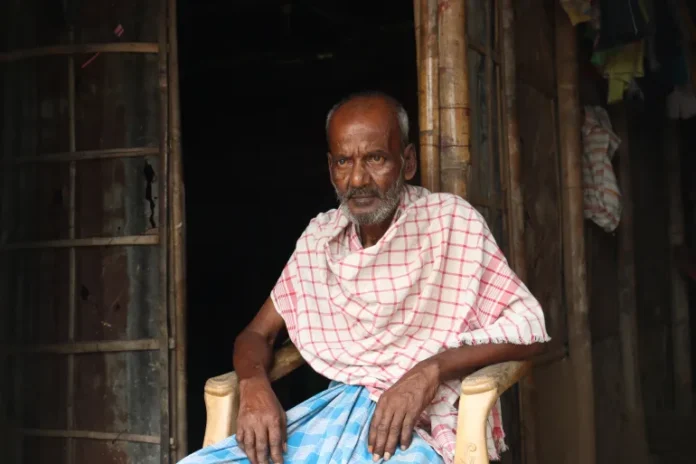Harsh pushbacks amid Assam crackdown
Since late May, over 300 Muslims in Assam, declared “foreigners” by special tribunals, have been taken to the Bangladesh border and forced off Indian soil by the Border Security Force (BSF) (reuters.com). Among them was 67‑year‑old Ufa Ali, a bicycle mechanic from Morigaon, who was arrested on May 23 and held at Matia detention center. On May 27, he and others were driven to the international borderline, stranded in chest‑deep water for 12 hours, threatened at gunpoint, and fired upon with rubber bullets .
Similar cases across Assam
A local teacher, Khairul Islam, declared a foreigner despite possessing ancestral land deeds and a pending Supreme Court appeal, was detained and similarly expelled (observerbd.com). Rahima Begum, picked up from Golaghat, recounts beatings during her forced transfer, while Miranul Sheikh and others from West Bengal’s Murshidabad were also forcibly pushed to the border and threatened with gunfire (theguardian.com).
These tactics, widely criticized as “forced expulsion” rather than legal deportation—and which bypass due process—are justified under Assam’s controversial interpretation of a 1950 district‑commissioner law, but denounced as illegal under national and international legal norms .
Nationwide spread; BJP’s role
Emboldened by the BJP’s rise since 2016 and a post‑Pahalgam militant attack crackdown named “Operation Sindhoor”, authorities in Gujarat and Maharashtra joined the campaign, detaining over 250 Muslims alleged to be undocumented and pushing them toward Bangladesh (theguardian.com). In Maharashtra, seven were handed to BSF but returned after West Bengal officials intervened (theguardian.com).
Bangladesh protests; returns begin
Bangladesh’s Border Guard (BGB) resisted the pushbacks—detaining about 1,272 individuals from India, including apparent Indian citizens and Rohingya (brecorder.com). Dhaka lodged official protests, urging India to follow verification and deportation via formal diplomatic channels .
Some deportees flagged as illegal were rescued by Bangladesh and sent back to India, including 200+ who walked home through dense forests (harmonictimes.com). Still, families of at least 100 people remain missing, with several petitions already filed in Assam’s High Court and the Supreme Court (news.abplive.com).
Legal and rights challenges
Human rights organizations (e.g. Odhikar, Human Rights Watch) and political parties (e.g. CPI(M), Congress) condemn the operations as arbitrary, communal, and illegal, violating constitutional Articles 19 & 21, customary international law, and agreements around non‑refoulement .
Notable legal action includes petitions to the Supreme Court for Monowara Bewa, whose deportation proceeded despite her appeal pending since 2017 (news.abplive.com). The courts are now reviewing habeas corpus writs and missing‑persons litigation from affected families (theguardian.com).
🔍 Context and dynamics
- Assam’s Colonial Legacy
The British-era tea laborers migration from East Bengal (present-day Bangladesh) has fueled a persistent identity anxiety in Assam, culminating in the 2019 NRC which excluded around 2 million residents, heavily impacting Muslims (≈700,000) (aljazeera.com). - Citizenship Amendment Act (2019)
This act fast-tracks citizenship for non-Muslim migrants (Hindus, Sikhs, etc.) from neighbouring countries, exacerbating discrimination against Muslims accused of being “Bangladeshi infiltrators” (en.wikipedia.org, aljazeera.com). - Rise of Hindu Nationalism
Under PM Modi and Home Minister Amit Shah, framing Muslim citizens—especially Bengali-speaking—as “termites” or terrorists has bolstered xenophobic policy measures, which Assam’s Chief Minister Himanta Sarma has operationalized .
🔑 Key takeaways
| Issue | Facts |
|---|---|
| Scope | Over 1,200 persons pushed into Bangladesh since early May; Assam alone ~303 (brecorder.com) |
| Target | Predominantly Bengali-speaking Muslims, including verified Indian citizens |
| Violation | Occurs without formal deportation; courts and rights groups label it illegal and arbitrary |
| Legal pushback | Supreme Court reviewing cases; High Court examining missing-person petitions |
| Diplomatic friction | Bangladesh lodged formal protests; some deportees returned |
This reveals a widening tragedy: individuals stripped of due legal process, forcibly expelled at gunpoint, many with evidence of Indian citizenship, and left stranded in no‑man’s land—“foreigners” to both India and Bangladesh. The affected are seeking justice through India’s highest courts, while Bangladesh asserts violations of international norms and its sovereignty.










